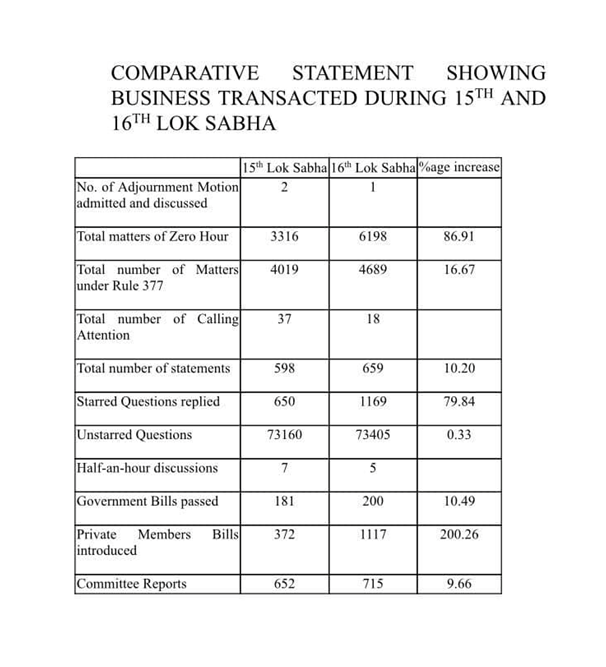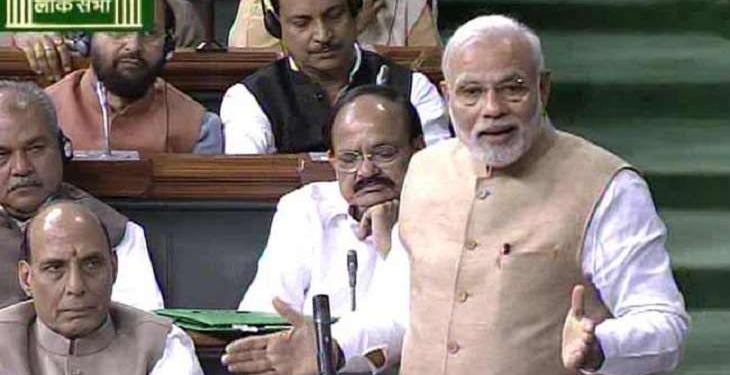On Wednesday, Narendra Singh Tomar, Union Minister for Parliamentary Affairs, Rural Development & Panchayati Raj, said that the Budget session of the Parliament is a successful one. A PRS Legislative Research report further substantiated his claims and stated that the Lok Sabha under the Modi Government is 20% more productive than it was in the UPA-II era. The 16th Lok Sabha under the NDA government worked for a total of 1,615 hours, which is 20 per cent more than the 15th Lok Sabha of the former PM Manmohan Singh. During the 16th Lok Sabha, a total of 180 bills were passed and 45 ordinances promulgated.

Explaining the details of the Parliamentary procedures, the Union Minister urged that in 331 sittings of the Lok Sabha, 205 bills were passed and the productivity was 85 percent. Rajya Sabha had 329 sittings, in which 154 bills were passed and the productivity was 68 percent.
Despite the opposition holding the parliament hostage, the incumbent government outsmarted it and got several bills passed in the parliament. As per the Parliament proceeding think tank, PRS, the Lok Sabha spent 32 percent of its time on legislative business, which was higher than the average of previous Houses. Some of the major issues discussed in the 16th Parliament under Modi Government are the agrarian crisis in the country, inflation and various natural calamities. Issues like the Andhra Pradesh reorganisation law, Rafale jet deal, alleged misuse of investigative agencies, economic offenders, Cauvery water dispute were raised by the opposition in both the Houses, causing disruptions. However, the productivity of the Parliament is enhanced than that of the previous one of UPA-II.
On the same note, Lok Sabha Speaker, Sumitra Mahajan, too said 205 important legislations were passed. These include laws to curb black money as well as those related to juvenile justice, GST, Aadhaar and 10 per cent reservation for the economically weaker section of people. She further urged Member of Parliament to introspect adding, “In the last session of the 16th Lok Sabha, it is time that we introspect whether we have lived up to the expectation of the people during the last five years”. Further wishing luck to the members for the ensuing general elections, LS Speaker went on to add, “What we have achieved and what still needs to be done. We should do an impartial analysis”.
According to PRS, the 16th Lok Sabha spent 32 per cent of its time on legislative business, higher than the average of other Lok Sabhas (it used to be 25 percent of the total timing). Further, the report stated that the 16th Lok Sabha spent 13 per cent of its time on question hour, 10 per cent on short duration discussions, and 0.7 per cent on calling attention motions.
Stating the seriousness of the Modi government regarding the issues and policies, the data said, 32 per cent of the bills were discussed for more than three hours in Lok Sabha. This is higher than the previous two Lok Sabhas (22 per cent and 14 per cent in the 15th and 14th Lok Sabha respectively). Not only that, a significant decrease is seen in the bills that passed within 30 minutes; from 26 per cent in the 15th Lok Sabha to 6 per cent in the 16th Lok Sabha. Although more bills have been discussed for longer, this Lok Sabha has referred a significantly lower proportion of bills to standing committees for scrutiny. It is the proof that the NDA government is more competent to run the nation that the UPA, which had the power for about half a decade.
Another noteworthy fact is that out of all the bills that were introduced, only 25 percent were referred to standing committees, much lower than 71 per cent and 60 per cent in the 15th and 14th Lok Sabha respectively.
It seems that the Congress’ attempt to hinder the proceedings of the Parliament went down just like their popularity among masses. The Grand Old party and many liberal thinkers claimed many-a-time that the BJP is natural opposition, however these figures on the parliament’s productivity seem to be blatantly destroying all such claims.

























